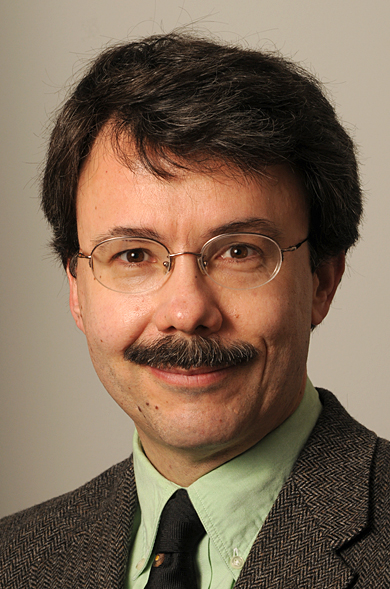

 On camera
On camera
Click here to view video
To make studio and satellite
arrangements contact the
br>(765) 494-2096. After hours,
call (765) 412-0864.
James McCann
(765) 494-0738
mcannj@purdue.edu
Related Web sites:
James McCann:
https://www.polsci.purdue.edu/
Directory/Faculty/mccann.html
https://www.purdue.edu/uns/images/
+2008/mccann-j08.jpg
Purdue Expert
Political conventions, Mexican immigrants in 2008 election, public opinion and political corruption, election history
Written news tip below:
Political conventions more show than substance
Video at left, expert discusses:
• Political conventions' role in the 21st century
• Mexican immigrants' role in the elections
• Election history
News tip: Political conventions more show than substance
WEST LAFAYETTE - Both the Democratic and Republican national conventions have more to do with the parties' image than the delegates' preferences for president, says a Purdue University political scientist.
"The conventions are like greeting cards to Americans from their political parties," says James McCann, professor of political science. "There was a time and place when conventions really did matter in candidate selection. Think back to the days of the so-called 'smoke-filled backrooms' where a group of party elites would decide whom to nominate. But that has not been true in our lifetimes.
"That's not to say that conventions are politically inconsequential. They have a lot of symbolic oomph. They are the calling card for their party. They show off the parties' best and brightest to America."
The Democratic National Convention is Aug. 25-28 in Denver, and the Republican National Convention is Sept. 1-4 in Minneapolis-Saint Paul. Both parties will focus on deciding where they stand on issues such as the deficit and foreign policy, McCann says.
The conventions are also the place where the vice presidential running mates are unveiled.
"Both conventions are rather late and close to November, so there is not as much wiggle room between the main nomination event and the fall campaign," McCann says. "When each nominee announces his or her running mate, that vice president had better look good. You want to get it right."
In 1972 George McGovern switched running mates from Thomas Eagleton to Sargent Shriver when it was revealed that Eagleton had mental health problems. McGovern and Shriver lost.
"Needless to say, neither party will want to take any chances in recruiting a vice presidential nominee, and all delegates - even if they prefer Huckabee, Edwards, Romney or some other unsuccessful candidate - will be on their best behavior. They will make their 'postcard from the convention' look right."
More about James "Jay" McCann
Professor of political science
McCann is an expert on electoral polling, U.S. public opinion, and U.S. and Mexican political parties. In 2006, he began surveying Mexican immigrants regarding political participation and other civic issues. His research also has focused on how sophisticated voters are about politics; how citizens evaluate "corruption" in government; and how procedures for nominating candidates for public office affect political parties. He studies presidential candidate concession speeches as well. McCann is frequently quoted in the media about American politics and public opinion. He worked as a guest scholar at the Brookings Institution in Washington, D.C., in 2002-03. In 2000 he served as an international election observer in Mexico.
Writer: Amy Patterson Neubert, (765) 494-9723, apatterson@purdue.edu